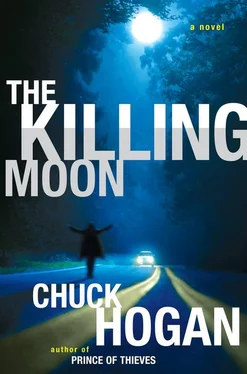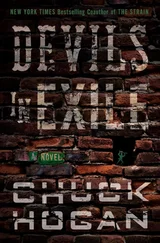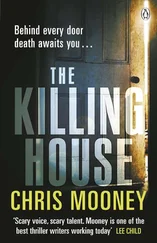Dr. Bolt closed his eyes, swooning a bit at the thought of the destruction awaiting him behind this door. “Frankie. This is known as clinical paranoia. You have not slept in a week—”
“Here they come again!”
Dr. Bolt heard a table — it would be the high credenza, the one standing beneath the picture window, that had been his mother’s — fall, and then glass — yes, the frame holding his grandmother’s engagement portrait, an antique, irreplaceable — smash and tinkle.
He whipped toward the street. A white sedan approached.
“Don’t let them in, doc!” came Frankie’s voice behind the window. “They’ll kill you to get to me!”
The automobile rolled past, and Dr. Bolt recognized Mrs. Poulin leaning over the wheel. She brought her cockatoo in to get his wings clipped every three months. The bird’s name was Hamilton. Mrs. Poulin waved.
Dr. Bolt stood there holding up his flat hand.
“What are you doing?” said Frankie. “Are you signaling them? You’re signaling them! ”
Dr. Bolt put down his shaking hand. Earlier in the day, one of his best customers, the kind of woman who could single-handedly keep his practice afloat for an entire year, who some in town unkindly referred to as the Zoo Lady, had asked him why he had left his stereo playing so loudly to an empty house.
And just now, Tracy Mithers, from the llama farm on Sam Lake, showed such concern for him as he threw together his bag and begged off in evident distress, pager in hand.
He was going to lose everything.
What Frankie did not know — and could not ever know, for it would only explode his already flaming paranoia — was that Dr. Bolt already had a legitimate reason to fear the Black Falls police. And by Black Falls police, he meant specifically Bucky Pail.
“Frankie. You paged me, do you remember? You said you needed me, you needed my help. I am here now. Let me come inside. Let me help you.”
The curtain rippled again. He heard breathing on the other side of the door.
“Please,” said Dr. Bolt.
The lock turned. The door was pulled open a few inches.
Frankie stood behind it, a steak knife in his hand, its tip bloodied.
His hunted eyes searched the street and yard, and then, settling on Dr. Bolt’s kindly country-doctor face, the stress lines around them slackened. For a moment Frankie was just a teenager again, possessed of the neediness and confusion that marked his age.
He pulled the door open wider, and Dr. Bolt saw that Frankie had been using the knife tip to pick at the sores on his face.
“Help me,” Frankie said.
He was an ugly boy, yet there was something beautiful in the pain of his ugliness, something angelic and touching. His vulnerability was exquisite. A mutt with a sad limp and a mangy coat. Wanting only to lay his head in the lap of an owner who would not mistreat him.
Dr. Bolt had always assumed that the predator-prey relationship came down to the simplicity of strength versus weakness. But it was so much more symbiotic than that. He saw it now as a negotiation of vulnerabilities. The very same vulnerability that made Dr. Bolt easy prey for a blackmailer like Bucky Pail — specifically, Dr. Bolt’s affinity for the attentions of much younger men — was what compelled Dr. Bolt to exert his advantage over Frankie Sculp. In other words, the strong were just as vulnerable to the weak. There was no one without the other.
Inside, he found his living room dismantled. Completely destroyed. A shambles. What a damn fool he was. Much too old for these ups and downs.
But this was what a life without love did to you. It put you at risk. To the temptations of a mercurial teenager, and to a dark manipulator like Bucky Pail.
Dr. Bolt allowed the frail, weeping boy into his arms and helped him down the hallway to the bathroom, to dress his self-inflicted wounds.
Cullen stood a couple of careful feet away from his backyard swimming pool, still wearing his dress shirt and pants from the office. He maintained the pool from the beginning of June through the end of August, keeping it skimmed, pH-balanced, and algae-free for his wife and two sons and their daily summer guests, even though Cullen himself did not know how to swim. Witnessing the childhood drowning death of his older sister had left him with a pathological fear of immersion. Once every year or two, on a warm night and with his wife close at his side, he would sit at the edge of the shallow end for a few minutes and dip in his bare legs up to his shins, stirring the water he cleaned so diligently all season. His wife had grown up with a pool and thought it important that the boys not suffer for their father’s phobia. So he had taken upon himself its care and feeding as a way of managing his fear, of localizing the source of his dread, trapping it here in his backyard, as one might take on the care and feeding of a chained dragon.
Why he had so much respect for Maddox, he supposed. Someone who could wade in over his head, swim around, touch bottom and resurface time and time again. Someone who could go under and hold his breath there for so long.
The crescent moon, silver as a scythe, grinned at him from the surface of the still and silent water. Cullen’s sister’s name had been Emily, and when she ran her hair had flown off her shoulders like golden wings. He had adored her.
A light came on in the second floor of the house. The shadow of his wife, whose name also happened to be Emily, passed the window of the upstairs bathroom. Rubbing in hand cream, getting ready for bed, her nightly routine.
Cullen stepped farther back from the edge, returning his attention to Maddox on the cordless. “You heard about the cadet class?”
Maddox said, “What?”
“A trainee class from New Braintree is being bused your way first thing in the morning. One hundred and something recruits for a field search of the state forest.”
“The Borderlands?”
“I guess they had some K-9s indicate.”
They were disconnected briefly, and a recording asked Maddox to please deposit seventy-five more cents.
Cullen said, “Where are you calling from?”
“A pay phone outside the gas station here.” Tones sounded as Maddox’s coins fell. “My point is, the guy’s hitting on this cult stuff, which is bullshit. He’s floundering. Desperate.”
“See, Hess bet the house on the ditchdigger and his blood DNA, and lost. He thought he had a quick arrest to pad his clearance stats, told his sergeant it was a done deal, and now here he is, still working the same folder. Burning up manpower and money. Frankly, he got lucky with the sex offender angle, buying him a few more days. Because the DA won’t be seen as soft on pedophiles. But he’s got a very small window of time left to find Sinclair, and the sill’s slamming down hard on his fingers.”
“I think he’s in deeper shit than he knows.”
“You don’t see Sinclair for this, but you’re the only one. Hess is on the right track here. He’s got blood, he’s got hair — even if it is wig hair — he’s got treads from the brand of sneaker the suspect was known to wear. He’s got fibers from the offender’s apartment—”
“He’s got what?”
“Fibers matching a living room rug. As well as a few skin cells he likes for Sinclair, that he’s still waiting on tests for. See? All your dancing around him is bullshit and counterproductive. Just come out to him. Our thing is dead and all but buried.”
“No way. Not yet.”
“If it’s Sinclair — and, plainly, it is — then we’ve already lost. The case is nothing. It was thin to begin with, relying on the word of a convicted sex offender. But a convicted sex offender who’s also a killer? Find a DA in this country, in this world, who would bring that case.”
Читать дальше












